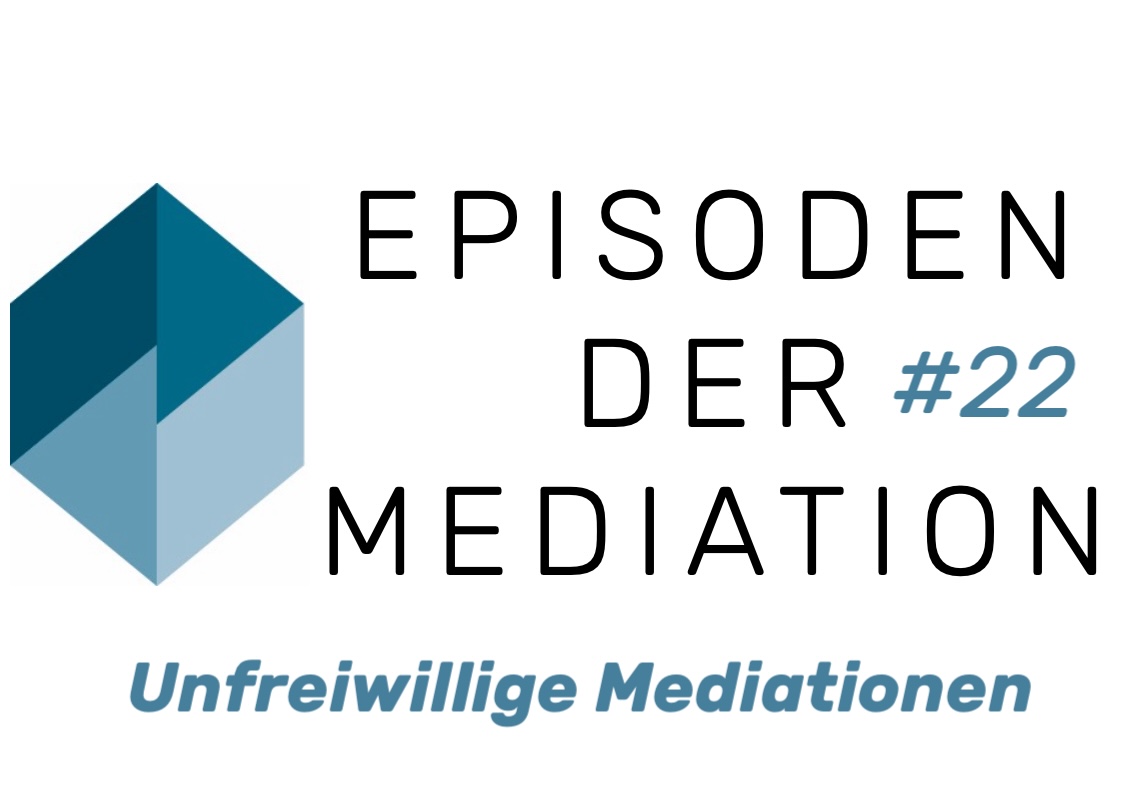#22 EdM – Involuntary mediations
Which mediation constellations are clearly involuntary and therefore not permitted mediation?
Episodes of mediation.
The podcast on practical questions about mediation and conflict management.
Welcome to the episodes of mediation,
the INKOVEMA podcast on the practical issues of mediation and conflict management.
I am Sascha Weigel and in this podcast I explain case questions from my mediation and conflict counselling practice. I present concepts and models of mediation and categorise different perspectives and decision-making options.
This is episode 22 – Involuntary mediations
Which mediation constellations are clearly involuntary and therefore not permitted mediation?
The characteristic of voluntariness is a Constitutive feature of mediation and concretisation of the principle of personal responsibilitywhich is superior to mediation as a conflict resolution process. Mediation is not feasible without personal responsibility and therefore also not without voluntariness. BUT – and this is important – mediation is not a hedonistic process. For hedonism, the highest ethical principle is the pursuit of sensual pleasure and enjoyment. And mediation is not about that.
Even in a world that promotes individualism, e.g. through individual rights, human rights and fundamental rights, in this world that is granular, produces singular personalities, generally demands personality development and, above all, rewards self-management through to self-optimisation, even in this world mediation is by no means only reserved for those who feel a desire to grow from their conflicts and interpret mediation as a transformative event.
In principle, mediation takes place voluntarily even if the parties involved feel displeasure, discomfort, even disgust and horror. Comparable phenomena that people carry out voluntarily, albeit with discomfort, are the bad-tasting lunch that has been bought (but people have to eat!); the marriage that could be dissolved, sometimes – has to be dissolved for medical, child welfare or other third party reasons, but is nevertheless continued; as well as the employment relationship, which is by no means a forced relationship, especially not in a welfare state in which a labour market is increasingly establishing itself. The list could be extended to include many similar phenomena. However, it is already clear here that the concept of voluntariness cannot be linked solely to subjective feelings in a subjectively defined moment in time, but that these feelings must fit into an objective corset. Or in short: mediation is not a hedonistic event, I would like to say it again at this point.
The European Mediation Directive 2008/52/EC in Art. 3 emphasises that a judicial proposal, a judicial order or a legal requirement for mediation is possible and lawful.
And in practice, this topic is as relevant as it is confusing, challenging mediators, clients and conflict parties alike. In any case, I have had countless mediations in which I have had to discuss with the parties to the conflict what voluntariness means in terms of the law – and to what extent they (would have to) participate voluntarily.
The characteristic as a legal feature of Section 1 (1) MediationsG is also controversial. According to this, mediation is a confidential and structured procedure in which the parties voluntarily and independently endeavour to reach an amicable settlement of their conflict with the help of one or more mediators. And according to § 2 Para. 2 Mediation Act, the mediator must ascertain whether the parties to the conflict are participating in the mediation voluntarily. In other words, the Mediation Act calls for voluntary discussions!
Among lawyers, this legal characteristic is also controversial – and courts have not had many opportunities to practice and thus deepen the interpretation of this characteristic.
And this characteristic is probably even more controversial among mediators.
It is therefore important to clearly define the issues and to remain aware of the relationship between law and mediation: The question of voluntariness is, on the one hand, a legal question of the legality of mediationbut on the other hand, and also(!) mediatorially a question of the practicability of mediation.
Even if the law still recognises the voluntary nature of mediation, this does not mean that all mediatorswould also carry out the mediation. From a professional point of view, as a mediator you canThe mediator can certainly make higher demands on the constitution of the parties to the conflict than the Mediation Act does. But lower standards are not enough. That is the logic of the law.
In this practice-orientated educational podcast, I would like to approach the different facets of this characteristic in the coming episodes, using practical cases to deepen understanding where possible.
Today, I am starting to clarify case constellations in which – as far as I can see from the literature and the diversity of opinions on the subject – involuntariness is undoubtedly present. Contradictions and other opinions are of course allowed – and are welcome in the comments on the website or on social media or by e-mail.
Case 1) Separation and divorce mediation In a variation of a real case from my practice, involuntariness to a separation and divorce mediation would be affirmed if one of the spouses forced the separation and divorce mediation with the fact that otherwise the – in this case – three children would be alienated from the other party, which would have been possible due to the distribution of attendance and work and could have been made credible. In this case, the means of coercion (threat of an evil, namely the social position vis-à-vis fourth parties, persons not present) is not in any permissible proportion to the intended purpose (to reach agreements in the presence of a mediator). The circumstances that triggered the conflict and the mediation intentions were interpersonal misdemeanours of the coerced person, in this case so-called cheating.
Case 2) Working world An employer threatens an employee with dismissal or other labour law sanctions if the employee refuses to participate in mediation within the workforce(!). Such threats or coercion are unlawful and violate the voluntary nature of participation.
Generally speaking, in the case of workplace disputes and the question of mediation, a distinction must be made at the outset as to whether the mediation is between the parties to the employment contract (i.e. the employer organisation and the employee) or between the employer organisation and the employee.in) or for mediation between colleagues(i.e. between employees).
Case 3) One spouse threatens to withhold financial support or alimony from the other spouse if the other spouse does not participate in mediation centred on a different conflict within the family or marriage. This type of financial coercion, known as blackmail, generally constitutes unlawful coercion.
Case 4) In a contract between an entrepreneur and a consumer, i.e. in principle also in an employment contract between an employer and an employee, a clause is included that forces a party to conduct mediation in every conflict, especially under the threat of considerable financial disadvantages or contractual penalties if it refuses to do so. Such clauses are generally considered unlawful. In this case, – in the case of general terms and conditions – the legal concept of Section 309 No. 14 BGB also applies.
Case 5) A superior orders a subordinate employee to participate in mediation between colleagues or with suppliers by explicitly threatening specific professional disadvantages such as transfers or the denial of promotions. This regularly constitutes an abuse of power and is unlawful.
However, it is difficult to draw the line between this and the fact that such contractual sanctions lurk in the background of the right to issue instructions. In principle, it is recognised that the employer must draw consequences from the unresolved conflict situation (also out of a duty of care towards the employees!) – and that mediation is a milder means for employees insofar as they can co-determine and influence these changes. We will have to go into this in more detail in the following episodes. In practice, this is the foggy and grey area of theory. Firstly, however, it can be stated that the threat of specific disadvantages generally justifies involuntariness.
Case 6) A landlord threatens a tenant with unjustified termination or unspecified legal action if the tenant refuses to take part in mediation regarding disputes about refurbishment measures and costs. Such threats, in which means and ends are not directly related, are generally unlawful and impair the voluntary nature of participation.
Case 7) The same applies here: A hospital forces a patient to participate in mediation in a dispute over treatment errors by threatening to refuse necessary medical services or treatment. This practice is unlawful and violates patients' rights and the Mediation Act. This is because the sole-maker character, which mediation also has, is being sought here, which makes the request for mediation appear unlawful.
Case 8) This would also apply to a labour law conflict in which bullying or other allegations of discrimination are to be negotiated in mediation, but which would not come about without direct coercion. However, the situation is different if the specific individuals have initiated these (mediation) discussions and expressly want them.
This basic structure of the constellation – triangular relationships – can be transferred to a number of areas of social life and social participation:
Case 9) Communal area/neighbourhood conflicts A similar constellation is also conceivable in the public sector: a municipality or city administration forces residents to participate in mediation in neighbourhood disputes by threatening them with administrative fines or the non-performance of municipal services. Such measures are unlawful if they are taken without a clear legal basis. However, even if the announced consequences are lawful (enforcement of the failure to pay waste disposal charges, for example), mediation on a completely different issue may be unlawful, precisely because the ends-means relationship is not given.
Case 10) Education A school forces parents to participate in mediation in conflicts with teachers or the school management by threatening to expel the child from the school or otherwise penalise them. Such threats are unlawful and violate the rights of parents and children.
Case 11) Associations Internal conflicts in a sports club. Club officials force a member to take part in mediation. They threaten that the member will otherwise be expelled from the club or face other, specifically named sanctions that have nothing to do with the conflict. This linking practice is unlawful, especially if the association's articles of association or the applicable law provide for other clarification measures for these linked circumstances. For example, the association member has not paid their dues, which was known and tolerated, but now this circumstance is being used to obtain consent for mediation.
Case 12) Forced mediation in the banking sector A bank forces a customer to participate in mediation in disputes over loan terms by threatening to terminate the loan prematurely or impose other financial penalties. Such threats are unlawful and impair voluntariness.
Case 13) Forced mediation for public contracts A public authority forces a contractor to participate in mediation in disputes over contract performance by threatening to refuse future orders or terminate current contracts. This practice is unlawful if it occurs without a clear legal basis.
Case 14) Forced mediation in higher education: A university forces students to take part in mediation in conflicts with professors or the administration by threatening not to recognise academic achievements or to refuse enrolment. Such measures are unlawful and violate the rights of students.
Case 15) Forced mediation in religious communities: A religious community forces a member to participate in mediation in internal conflicts by threatening expulsion from the community or other social sanctions. Such threats are unlawful and jeopardise the voluntary nature of participation.
That’s it for this time, thank you very much for listening, and perhaps you were able to develop one or two ideas for one of your cases, take them further and make decisions. I wish you every success!
If you would like to support this podcast, please leave feedback on Apple Podcast or on Google Business.
For now, I bid you farewell with my best wishes. See you next time!
Get through this time well! Prof Dr Sascha Weigel





During my training, I already looked into the concept of voluntariness and came to the conclusion that I find this term unusable in the wording of the legal text, as it offers no added value, but only leads to confusion and provokes debates that take the concept of voluntariness ad absurdum.
My assumption is that the legislator wanted to cover the following two aspects with the concept of voluntariness:
He wanted to make it clear that mediation cannot be ordered by the state, i.e. it must not be a coercive measure. Voluntariness in the sense of the absence of coercion by law.
Creating a basis for people to show a willingness to participate if they agree to mediation. Voluntariness as an intrinsically motivated act to contribute to conflict resolution.
I also assume that the legislator did not intend to restrict the scope of application of mediation for no reason, as long as the above-mentioned criteria remain fulfilled.
However, what is now happening in the debate about voluntariness is not conducive to the cause in any way. I recognise two developments in particular: On the one hand, the restriction of one's own willingness to mediate, as I have to assume that in the case of subtle coercion, threats, etc., there is no longer any voluntariness here; on the other hand, the expansion and thus redefinition of the concept of voluntariness in order to harmonise real existing mediation cases and areas with the legal text.
Furthermore, the concept of voluntariness is also highly unsuitable for drawing the line precisely at the point where the willingness to co-operate is no longer given and effective mediation can no longer take place. Depending on the interpretation of the term, everything could be labelled as voluntary as long as the person is not forced into mediation by physical force or, conversely, any subtle coercion that gives the mediator the feeling that they would rather not be here could be seen as a criterion for exclusion.
In any case, I see this podcast as a doomed attempt to draw a clear line between voluntariness and involuntariness. To go into the examples: Just because coercion, a threat or other means of pressure are used does not mean that the party cannot still be willing to co-operate and that effective mediation could take place. Similarly, just because these things are not said does not mean that they cannot still be felt by a party and that there may be no willingness to co-operate.
The voluntary clause only makes sense, if at all, if it is addressed directly to the court and state institutions and makes it clear that they may not use mediation as a means of coercion. However, even here I do not clearly see that ordered mediation could not also be successful, because the following also applies here: just because mediation is ordered does not necessarily mean that there is no willingness to co-operate.
I would like to conclude my plea with what I believe is the only effective proposal to amend the Mediation Act.
Here is my proposal for an amendment to the Mediation Act:
§ Section 1 (1) Mediation Act (adapted): "Mediation is a confidential and structured procedure in which the parties endeavour to reach an amicable settlement of their conflict on their own responsibility with the help of one or more mediators."
§ Section X (new): "The law does not oblige the parties to accept an offer of mediation, nor do they face any legal disadvantages if they refuse or cancel mediation. In particular, legal recourse to the courts remains unaffected."
§ Section 2 (2) Mediation Act (adapted): "The mediator shall ensure that the parties have understood the principles and procedure of the mediation process and are willing to co-operate."